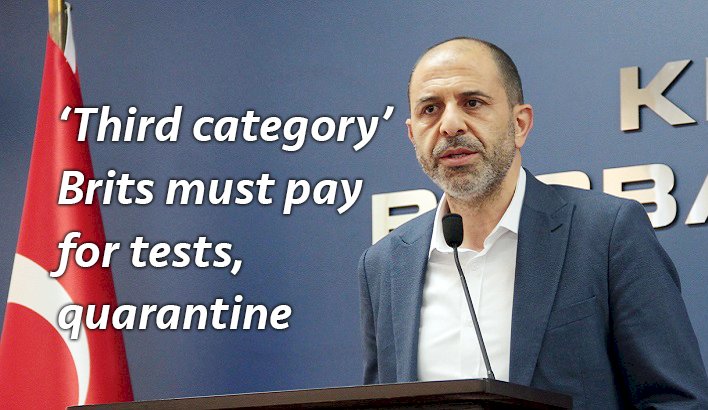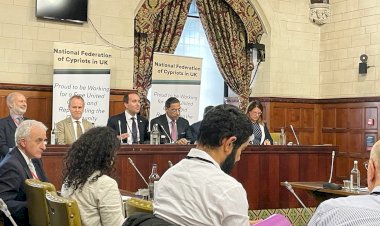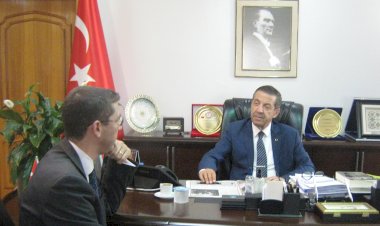WELCOME TO CYPRUS!

The Council of Ministers announced international categories for TRNC entry. They are also considering – but have yet to rule on - the introduction of “risk insurance” in case visitors contract Covid-19 while staying here.
The United Kingdom was named in Category C – the highest risk category – alongside countries such as the United States, Iran, Russia, and Brazil, which have all recorded high corona virus death and infection rates
Visitors from these countries will only be able to enter the TRNC if they take a PCR test for corona virus 72 hours before travelling, which must be negative. On arrival, they will be quarantined for 14 days, at a cost of 4,400 TL (£510) per person, which must be paid in advance of travel.
The order is at odds with Turkey, which has opted for a more relaxed regime for travellers from Britain.
Deputy prime minister, foreign minister and government spokesman, Kudret Özersay, said: “We have placed high risk countries into Category C. People arriving from these countries will be required to undertake a PCR test before coming. Upon arrival, they will be required to pay for their 14 day quarantine period. They will only be able to enter the country upon fulfilling these conditions.”
Turkey, on the other hand, has been placed in “low-risk” Category A, a move slammed by Cyprus Turkish Travel Agents’ Union head Orhan Tolun, who said: “Turkey has a continuing outbreak. The UK has a continuing outbreak. But they put the UK in the third class category, and Turkey in the first class. How justifiable is that? If they were going to put Turkey in Category A, then the UK should also have been put in that category.
“The two main countries whichare the source of our tourism is the UK – because of the large Turkish Cypriot diaspora and expats who own properties here as well as tourists,- and Turkey. The government has basically asked us to completely forget any visits from the UK this year.”
But British Residence Society (BRS) chairman Peter Wilkins, said: “I support the action taken by the government to protect the people of Northern Cyprus.”
He said the BRS had been “frustrated” by press reports and social media posts that had misrepresented the situation. “We read with horror unchecked social media posts and reports that quarantine was to be scrapped for certain. But we knew this would not happen. We always said that it would relate to the country of origin. The TRNC government cannot just ‘switch it off’ concerning quarantine for people coming from a high risk country. This would have been unlikely from the start.”
Mr Wilkins also said he could understand why Turkey was in category A when compared to the UK: “The rate of transmission in Turkey is far, far lower than that of the UK,” he said
With Turkey in Category A are people from Austria, Bulgaria, Denmark, Germany, Greece, Israel, Lithuania and Malta who are free to enter North Cyprus, provided they show negative for a PCR test taken within 72 hours before travel.
The new rules for overseas visitors apply to all, regardless of how they enter the country, whether by air or sea.
After an absence of nearly three months, flights between Turkey and Britain restarted on Thursday. The British embassy in Ankara confirmed British nationals resident in Turkey could return to the country with immediate effect. They would be subject to a health screen on arrival at a Turkish airport. Those who failed would require further “medical evaluation”, while those who pass this check would be required to self-isolate at home for a period of 14 days.
Turkish Airlines will operate one daily flight from Istanbul Airport to London Heathrow, while its subsidiary AnadoluJet will resume one daily flight between Istanbul Sabiha Gokcen Airport and London Stansted.
Meanwhile, here, countries listed in Category B, such as Croatia, the Czech Republic, Poland, and Switzerland, will required to take a double PCR. The first test must be taken within 72 hours before travel and the results return as negative. The new arrivals will have to take a second one when they enter the TRNC.
Category B visitors will be able to stay in a place of their choice. However, if their second PCR test is positive, the authorities will immediately transfer them to a hospital if they are showing symptoms, or a quarantine location.
Mr Özersay also said ministers passed a decision to allow crossings from South Cyprus as from July 1 – after permission was given for Turkish Cypriot workers to cross to this week on condition that they must undergo a 14-day quarantine period if they return. Otherwise, the checkpoints remain closed . The UN Peace Keeping Forces in Cyprus issued a written statement calling for “clarification” from the Turkish Cypriot side concerning the opening of checkpoints, stating that the UN stood ready to help.
“As from June 22, workers who go to South Cyprus, those who cross for educational or for medical treatment, plus Maronites who live in the TRNC, Greek Cypriots who live in the Karpaz, and the residents of [the mixed village of] Pile [located in the UN buffer zone) will be able to go and return on the same day. A random test system will be place thereafter.
“If there is nothing extraordinary by June 22, if there is no second wave and nothing major occurring, checkpoint crossings will be possible with the stated conditions,” he said.
Kudret Özersay said that on June 22 it will be 14 days since the Greek Cypriot side opened its airports allowing the arrival of passengers without them going into quarantine. By that date, he said, the picture will be clear as regards the corona virus situation and it will show how risky or not the opening by the south to passengers from abroad has been.
BRS chairman Peter Wilkins said that they held a video conference with Christina Smith – the vice counsel of the British High Commission yesterday. He said she confirmed with the “Turkish Cypriot administration” . . . that expired British passports that could not be renewed due to the Covid-19 pandemic can still be used in residency applications.




